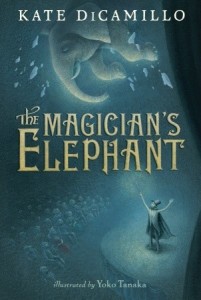We are told from the time we are children that there are magic words in this world—those words without which doors will remain closed, gifts undelivered, and candy or cookies left in someone else’s hand.
The magic words, of course, are please and thank you.
But there are other magic words which, even if we do learn them as children, we often outgrow them, whether by chance or by design, as we move into adulthood.
Those words, first uttered in The Magician’s Elephant by Leo Matienne, a “small policeman with a very large mustache, ” are What if? Why not? and Could it possibly be?
Leo Matienne’s questions are not often warmly received, most especially when a police captain and his lieutenants are scrambling to figure what to do with an elephant which has, in a most inopportune way, literally crashed into their little village. Rather than simply asking what should be done about the elephant, Leo Matienne asked other questions, like where she came from, and why, and what if there were more elephants or other animals, and what if “everything was to be irrevocably, undeniably changed by the elephant’s arrival?”
Most of the time, Leo Matienne’s questions were the sort that had no answer. And being confronted by such unanswerable questions can be, at times, a maddening prospect. Just ask Leo Matienne’s wife, Gloria, who was all too familiar with his What if‘s. “Oh, don’t start, ” said his wife when he uttered “What if.”
“Please don’t start.”
It was the What if? Why not? Could it possibly be? of Leo Matienne that led him with Peter Augustus Duchene into the streets that night to find the magician, and Madame LaVaughn, and the elephant herself. Which led them in turn to find a singing beggar and his dog, and a laughing, bent-up sculptor, and ultimately, the thing they needed the elephant for: to reunite Peter with his sister Adele.
Salman Rushdie has been quoted as saying “A poet’s work is to name the unnameable, to point at frauds, to take sides, start arguments, shape the world, and stop it going to sleep.” If you believe Kate DiCamillo and her delightful character in Leo Matienne, then you can add to that list asking questions.
Leo Matienne had the soul of a poet, and because of this, he liked very much to consider questions that had no answers. (p. 34)
One could say that asking questions with no answers is a waste of time, even for a poet. But Leo Matienne, you see, understood something about questions.
We must ask ourselves these questions as often as we dare. How will the world change if we do not question it?” (p. 143)
Leo Matienne understood that questions can become for us the very magic we need not only to name the unnameable, but to shape and change the world.
“Magic is always impossible, ” said the magician. “It begins with the impossible and ends with the impossible and is impossible in between. That is why it is magic.” (p. 154)
Magic, if you believe the poet-policeman, begins with the simplest (and most difficult) of questions.
_____________________
This week we wrap up our book club discussion of The Magician’s Elephant, that we’ve been reading together this month. Have you been reading along? Perhaps you would share your observations about asking questions in the comments below. When has asking “what if” been like the magic words that opened a locked door for you?
Read our discussion Part One: Naming Names
Read our discussion Part Two: The Truth is Forever Changing
Read Kate DiCamillo’s Newbery Medal acceptance speech
Get another take on The Magician’s Elephant in What If Natural Selection is Wrong
Photo by Hiroyuki Takeda, Creative Commons license via Flickr. Post by LW Lindquist, author of Adjustments.
- Earth Song Poem Featured on The Slowdown!—Birds in Home Depot - February 7, 2023
- The Rapping in the Attic—Happy Holidays Fun Video! - December 21, 2022
- Video: Earth Song: A Nature Poems Experience—Enchanting! - December 6, 2022


Sandra Heska King says
My husband’s boss had talked to him (in the winter, I think) about an opening in South Florida. My husband had laughed it off. But when our son moved to Jacksonville, D and I asked each other, “What if?” So he called. The lateral position was still open, in the largest office in his company’s southeast region, and he was desperately wanted. So he left in May, and I will follow in a couple weeks. Just the other day, on his birthday, he received a surprise letter–he was promoted to corporate vice-president. I think that worked out well.
I loved this book.
Donna Falcone says
Such an interesting chain of events that unfolded for ALL of you. How amazing that they were still in such need of him and all he had to do was ask. Very cool.
Will Willingham says
Oh, what a fun turn from a simple question. 🙂
You will, I’m sure, have many more “what if”s to be asked as this transition goes on.
Donna Falcone says
When we were considering moving from PA to GA for a college that was willing to wait SIX MONTHS for Joe to get there, there was really no logical way to think about it. Everything was a risk and every plan that was made was made in the dark. We didn’t know our moving allowance and had to pay for it all up front, then wait with fingers crossed for reimbursement. Our kids, now grown young men, were settled in our home but unsettled in their lives. We needed a place to live. He said to me, and I scrawled across our bedroom mirror in glass writers – “It’s just going to be groundless for a while.” All of the What ifs, to tell the truth, got me in a tizzy… but the Why not? Oh… the why not was the best magic of all for us. We discovered that for every What if which skewed to the negative (what if we can’t afford the truck, what if we don’t find housing, what if we aren’t approved for a loan, what if our son relapses back into Lyme disease under the stress), there was this adventurous promise of WHY NOT?
It’s been so hard in so many unexpected ways, but I’m grateful for the reminders of this beautiful book – the magic of why not, and the always open invitation to question.
Will Willingham says
Why not? is a great question to ask, and then try to answer. Sometimes articulating the reasons Why not? helps us realize there are not such great obstacles as we can sometime see.
Such an adventure you’re on. 🙂
Sandra Heska King says
Why not? I’ve asked that question before, too. You’re right… it can be more powerful than “what if?” “It’s just going to be groundless for awhile.” I kind of know that, too. I love that you scrawled it on your mirror.
Megan Willome says
I think I’m more of a Gloria: “Please don’t start.”
Although I marked all the other passages you mentioned and have always loved the idea that maybe, somehow magic is possible in this old world, I identified with Gloria. It’s one of the first times in reading a children’s book that I felt I had nothing in common with the children.
Laura says
I haven’t read the book (though I probably will now). But letting myself ask “What if?” and “Why not?” was part of the process of moving from Arkansas back to Pittsburgh after 25 years, and deciding to start a freelance writing-editing-coaching business rather than looking immediately for the safety net of another 40-hour-a-week job. Part of it has been listening to some things I repeated as unquestionable truth and questioning them. (Like “I won’t move without a job in place.”)
Donna, Sandy, we haven’t talked about this much, but it’s given me courage to see other folks making big midlife moves too.
Donna Falcone says
Company is good to have, isn’t it?
Donna Falcone says
P.S. Gutsy move followed by gutsy move, Laura. All the best in your new business. 😉